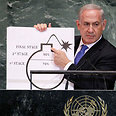
Netanyahu at UN with cartoon-like bomb. 'Course of action contained some fallacies'
צילום: רויטרס
Netanyahu’s miscalculations
Op-ed: Should Iran engage in long-term talks, Europe and US leaders may find easy way out of action
On September 27, 2012, Prime Minister Netanyahu addressed the United Nations General Assembly with a speech proving to be emblematic in regard to the strategy he chose to adopt for the sake of countering the threat posed by the Iranian nuclear program.
The red line he drew on a cartoon-like bomb was meant to reveal to the world Israel’s resolve to stop the Islamic Republic from obtaining the nuclear bomb. In fact, since getting into office, Netanyahu has been focusing his foreign policy efforts on calling the world’s attention to the crisis sparked by the Iranian leadership’s continued genocidal threats issued to the Jewish state along with the Persian will to acquire nuclear weapons and delivery means.
From Washington to London and from Paris to Moscow, Netanyahu has time and again toured international power hubs in order to assess the diplomatic and military will of his partners in Israel’s vital struggle against Iran’s strife to develop game-changing weaponry. While this course of action was necessary, it did contain some fallacies.
Former President Ahmadinejad’s repeated claims mixing the fate of the Jewish state with the development of atomic weapons led Netanyahu to see the Iranian nuclear drive as the prime threat to Israel, thus focusing the country’s partners’ attention almost solely on it. Should the West consider the new negotiations sufficient and perceive the rhetoric openings made by President Rohani as a step forward in the right direction, Iran may limit its drive toward nuclear weapons while tacitly gaining a free hand in its subversive operations worldwide.
The Iranian threat to Israel’s security must be understood and presented as a multifaceted and multilevel global set of operations in which the development of nuclear weapons and ballistic missiles is only a part of a larger plan whose objective is incompatible with the Jewish State’s stability.
Iran and Hezbollah as global threats
As any long-term strategic stance, the Iranian war against Israel is based on the development of strong foundations that can be used to cause damage. These assets may be defined by the two following points: the Iranian immediate presence in the Near East and the ability of Hezbollah to develop major rear bases and safe havens throughout the globe.In July 2013, the EU finally decided to define Hezbollah’s military wing as a terrorist organization. This decision was strongly lobbied for by the UK and by Israel. While many commentators considered it to be an inefficient and counterproductive decision, it did show that, with appropriate lobbying and information, the EU member states may take further actions against Hezbollah. This is a much needed new reality that should be closely followed through by Israel’s government.
In fact, nuclear weapons per se may not be enough to provide Tehran with far reaching strategic advantage; however Hezbollah’s quasi control over Lebanon and its power situation in Syria are effectively altering the regional balance of power. Iran is today controlling one of the strongest Arab armed forces able to conduct operations from Sidon to Najaf and from Damascus to Kuwait. Any negotiation with Iran should necessarily question its protracted desire to arm and command an element which has acted as a spoiler to peace to in the region and which openly calls for the destruction of the Jewish state.
The second point has far-reaching implications that go beyond Israel’s security. The fact that Iran uses Hezbollah as a terrorist network with global rear bases to implement its Near East policies should be employed to further unite Western powers and Israel in their common fight against Tehran expansionist policies. The Lebanese Shiite terrorist group has deep roots in Western Europe which it uses to fund its operations, stage political lobbying and possibly wage terrorist campaigns against European targets.
Since the 1986 series of bombings in Paris, Hezbollah has developed a deep network of operatives embedded in European societies. More than 950 elements linked to the Lebanese terrorist groups are found operating in Germany, while 250 are recorded in Belgium and a large community of pro-Hezbollah supporters functions in Sweden. These cells provide the Iranian proxy with funding through illegal trades and investments as well as political support via a widespread network of Islamic associates and groups. Due to its socio-political laissez-faire and its geographical position, Europe has effectively become a preferred Hezbollah rear base and a key to Iran’s Middle Eastern policies.
For this, Prime Minister Netanyahu should review Israel’s stance on Iran’s nuclear program by successfully upgrading the government’s international communication on the matter. Netanyahu may have miscalculated Iran’s willingness to address the nuclear topic and by doing so he provided Israel’s partners with an easy way out of action.
Should Iran engage in any kind of long-term talk, Europeans and American leaders would find an excuse to limit their efforts in regard to the threat posed by Tehran policies. For this, Israel should engage in a renewed communication effort which sets Iran’s expansionist policy and Hezbollah’s terrorist networks as global threats both to Israel’s security and to Western states.
Riccardo Dugulin holds a master's degree from the Paris School of International Affairs (Sciences Po) and specializes in international security. He is currently working in Paris for a Medical and Security Assistance Company. He has worked for a number of leading think tanks in Washington DC, Dubai and Beirut. His official website is www.riccardodugulin.com and official Facebook page is www.facebook.com/riccardodugulin










